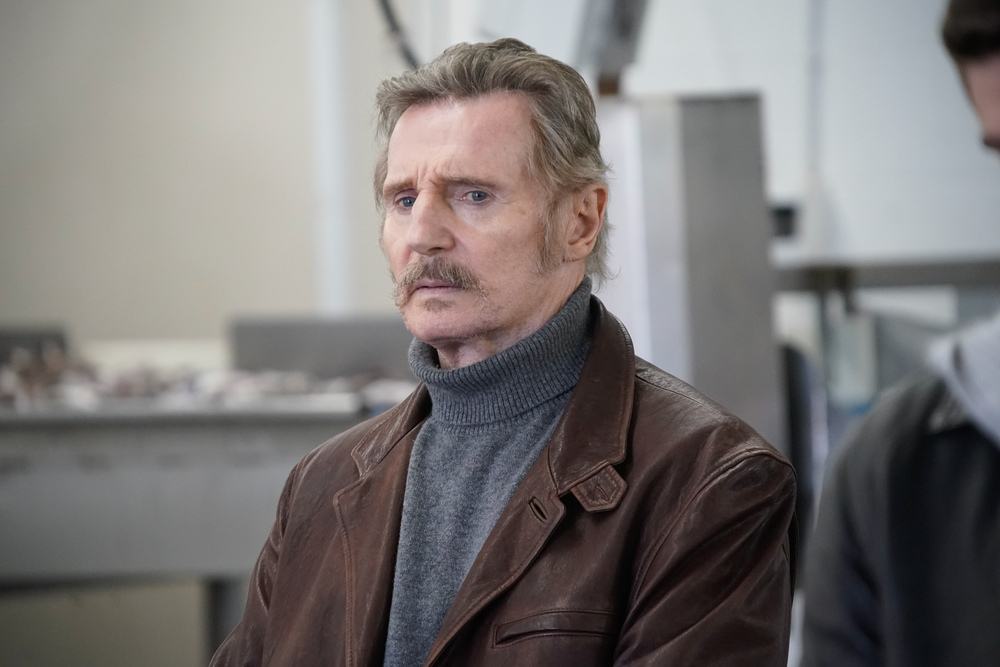Capsule reviews for Nov. 1

Liam Neeson stars in ABSOLUTION. (Photo: Samuel Goldwyn Films)
Absolution
Liam Neeson brings some grit and gravitas to the aging gangster at the center of this otherwise formulaic crime thriller from Norwegian director Hans Petter Moland (Cold Pursuit). Neeson plays a former boxer in Boston who has spent decades as an enforcer for a mobster (Ron Perlman) with connections to a sex trafficking ring. However, a terminal diagnosis changes his outlook, causing him to attempt a reconciliation with his broken family and ponder his mortality and legacy. Of course, getting out is more difficult than he realizes. More familiar than fresh, the screenplay is too gimmicky to work as a contemplative exploration of guilt and masculinity. (Rated R, 112 minutes).
Cellar Door
A thin premise doesn’t yield much meaningful tension in this twisty psychological thriller from director Vaughn Stein (Terminal) that offers a muddled look at trust, jealousy, and obsession. Looking to start a new family, John (Scott Speedman) and Sera (Jordana Brewster) are given their dream house by a mysterious benefactor (Laurence Fishburne) with the caveat that they can’t open the cellar door. But that prohibition fuels curiosity and suspicion that exposes past secrets while threatening to tear their relationship apart. The mildly intriguing premise feels strained at feature length, and all the red herrings and narrative misdirection feel like filler before the inevitable reveal. (Rated R, 97 minutes).
Dahomey
A royal welcome home after 129 years of political imprisonment is the centerpiece of this provocative documentary essay from director Mati Diop (Atlantics), which examines how the physical and psychological scars of colonialization linger for generations. Specifically, the film tracks the return in 2021 of 26 plundered artworks and treasures to the African nation of Benin from France, which had unlawfully claimed them during political unrest during the late 19th century. The occasion is cause for celebration, although a younger Beninese generation has mixed feelings about the motives and ramifications. Diop’s lightly fictionalized approach is both thoughtful and enlightening as it probes culture and history. (Not rated, 68 minutes).
Freedom
A conventional reworking of some potentially intriguing true-life source material, this combination of crime drama and romantic thriller from French director Melanie Laurent (The Mad Women’s Ball) offers mixed results. Among the positives is a magnetic portrayal by Lucas Bravo (“Emily in Paris”) as Bruno Sulak, the notorious robber known for good manners and avoiding violence while committing crimes alongside his complicit girlfriend (Lea Luce Busato), while trying to outwit a determined police commissioner (Yves Attal). Mixing in elements of breezy caper comedy, the film has its moments, yet lacks depth without yielding consistent suspense or narrative momentum. At least the antihero Sulak steals the show. (Not rated, 110 minutes).
The Gutter
Feeling more like a sitcom pilot than a fleshed-out feature, this broad bowling comedy features scattered big laughs but runs out of steam. Walt (Shameik Moore) is a slacker who lands a job at a grungy bowling alley, where he begins an unlikely rise to tournament stardom. But Walt’s brash talent draws the attention of a vengeful former champion (Susan Sarandon) who wants to undermine his sudden fame. Poking fun at cultural stereotypes and political correctness with offbeat charm, the playful debut of sibling directors Isaiah and Yassir Lester starts with freewheeling irreverence before eventually settling into a more predictable underdog formula, resulting in a spare. (Rated R, 92 minutes).
Lost on a Mountain in Maine
Unsure how to shape a compelling narrative from its remarkable true-life source material, this faith-based combination of documentary elements with fictionalized re-enactments lacks subtlety and surprise. It’s set in 1939, when mischievous 12-year-old Donn (Luke David Blumm) becomes separated from his family when a storm strikes during a hiking trip. He relies on his instincts and prays for a miracle while hopes for a rescue dwindle. Meanwhile, his father (Paul Sparks) grapples with guilt. The titular backdrop is scenic, although the film’s attempts to get inside the head of its preteen protagonist during his harrowing ordeal doesn’t translate to consistent suspense. It’s only mildly inspirational. (Rated PG, 98 minutes).
Soundtrack to a Coup d’Etat
The historic and cultural specificity carries a universal resonance and contemporary urgency in this immersive documentary connecting jazz music, government corruption, and the independence of a small African nation. It centers on a 1960 concert by Louis Armstrong amid unrest in the Congo, recently liberated from Belgium. However, Armstrong and other American “jazz ambassadors” were oblivious of their positioning within a conspiracy involving the raiding of natural resources, the formation of the United Nations, and the subsequent assassination of Congolese president Patrice Lumumba. This multisensory cinematic essay from director Johan Grimonprez untangles its web with conviction, offering a provocative examination of imperialism through a fresh lens. (Not rated, 150 minutes).